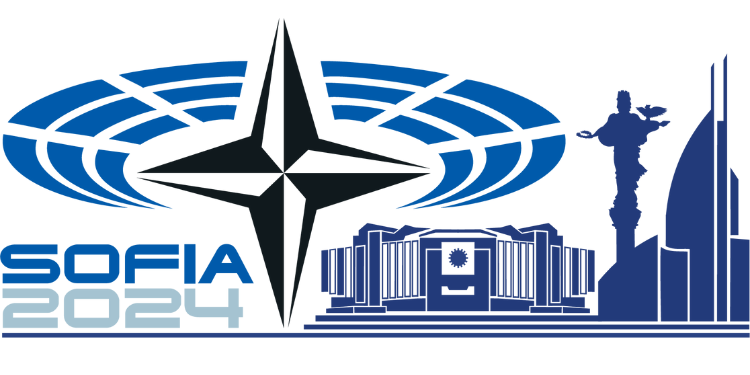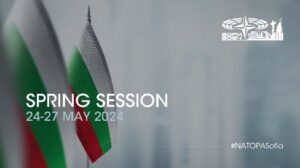NATO Parliamentary Assembly’s dual declarations: Supporting Ukraine and shaping NATO’s future
Spring Session NATO PA, Sofia (Bulgaria)
24-27 May 2024
In a timely move, the NATO Parliamentary Assembly (NATO PA) has adopted two significant declarations at its Plenary Sitting of the Spring Session 2024 in Sofia, Bulgaria. The declarations 489 and 490 collectively emphasize unwavering support for Ukraine amidst Russian aggression and outline a strategic vision for NATO’s future.
The recent NATO PA meetings in Sofia have yielded significant and impactful declarations. However, the responsibility now lies with the parliamentarians to ensure that these declarations are thoroughly discussed and supported within their national parliaments and finally lead to concrete actions. Additionally, heads of governments and states will need to play a crucial role in advancing these discussions and commitments at the upcoming Washington Summit in July.
Declaration 489: Standing with Ukraine until victory
Looking at the key points of this declaration, the NATO PA strongly condemns Russia’s war against Ukraine, denouncing attacks on civilian areas and infrastructure. They reaffirm support for Ukraine’s democracy, independence, sovereignty, and territorial integrity and calls for increased and timely military assistance to Ukraine, highlighting the use of immobilized Russian assets for Ukraine’s recovery.
For what concerns NATO’s role, the declaration stresses the importance of NATO’s support, including establishing the NATO-Ukraine Council and other assistance programs. Furthermore, it also advocates for a robust strategy to counter Russia’s threat and support Ukraine’s path towards NATO membership.
Finally, the declaration 489 encourages engagement with global partners to support Ukraine and condemn Russia.
Declaration 490: Shaping NATO for the next generations
Declaration 490 on the other hand reaffirms NATO’s core mission, namely acting as the cornerstone of security for Europe and North America, committed to defending democracy and the rule of law. It therefore addresses the current threats, identifying Russia as the most significant threat and highlights challenges posed by terrorism and China’s policies.
In preparation of the Washington Summit, it reminds at some Strategic Priorities. On Collective Defense the declaration emphasizes NATO’s readiness to defend Allied territory. For what concerns its Defense Investment the Assembly calls for full implementation of the Defense Investment Pledge.
Supporting Ukraine the NATO PA members urges accelerated military assistance and a comprehensive strategy for Ukraine’s defense.
The declaration furthermore advocates for a Centre for Democratic Resilience at NATO Headquarters. It also enhances NATO-EU Cooperation stressing the importance of strengthening the NATO-EU partnership. The Assembly calls with declaration 490 for reinforced relations with strategic partners globally, particularly in the Indo-Pacific region.
Ukraine: Progress in reforms on the way to NATO membership
Finally a draft report “Ukraine: Progress in Reforms on the Way to NATO Membership – Cherniev Report” discusses Ukraine’s ongoing efforts to meet NATO membership standards. The report highlights various reforms across political, economic, defense, military, resource management, security, and legal domains aimed at aligning Ukraine with NATO requirements. Key areas of focus include:
Ukraine has embarked on a series of political and economic reforms aimed at strengthening democratic oversight, improving governance, and reforming defense procurement to ensure transparency and accountability. These efforts are part of a broader strategy to align with NATO standards and improve overall security.
In terms of defense and military reforms, Ukraine is focusing on enhancing interoperability with NATO forces, increasing the roles of women in the military, automating logistics and medical support, and advancing defense technologies. These measures are designed to modernize the military and improve its operational efficiency.
Resource management is another critical area of reform. Ukraine is developing its defense industrial sector by corporatizing key enterprises and improving the efficiency of defense production. These steps are intended to bolster the country’s defense capabilities and ensure a steady supply of necessary equipment and materials.
Security enhancements are also a priority. Ukraine is establishing systems for handling NATO classified information, boosting cybersecurity, and setting up effective communication channels with NATO institutions. These initiatives are crucial for maintaining the integrity of information and ensuring smooth collaboration with NATO partners.
Legal adjustments are being made to harmonize Ukrainian laws with NATO standards and implement the necessary legal frameworks for integration. This alignment is essential for facilitating Ukraine’s transition towards greater cooperation with NATO.
Ukraine’s Comprehensive Assistance Package (CAP) aims to enhance support for its defenders through various measures. This includes improving physical and psychological rehabilitation services, upgrading healthcare facilities, and boosting blood supply systems. The initiative also involves digitizing veteran services and creating psychological rehabilitation centers to address the needs of military personnel. Additionally, the government has introduced social services for military personnel and their families. These services address various needs, such as psychological assistance and domestic violence prevention. The Ministry of Veterans Affairs is developing a long-term strategy to facilitate the transition from military to civilian life, ensuring that veterans receive the support they need during this critical period.
Overall, these reforms and initiatives are designed to strengthen Ukraine’s defense capabilities, improve governance, and support the well-being of military personnel and their families.
Ukrainian delegate MP Yehor Cherniev emphasized Ukraine’s irreversible path to NATO membership, contingent on fulfilling the required criteria. He also stressed the need to lift restrictions on using Western-supplied weapons against Russian attacks. The report acknowledges significant progress but notes that ongoing reforms will necessitate further updates.
Conclusion
The NATO Parliamentary Assembly’s dual declarations 489 and 490 as well the Cherniev Report reflect a firm stance on supporting Ukraine and a forward-looking vision for NATO’s role in global security. Declaration 489 emphasizes the necessity of Ukraine’s victory against Russian aggression, while Declaration 490 outlines strategic priorities to ensure NATO’s readiness to face future challenges. Together, these documents highlight the Assembly’s commitment to collective defense, democratic values, and international stability.



